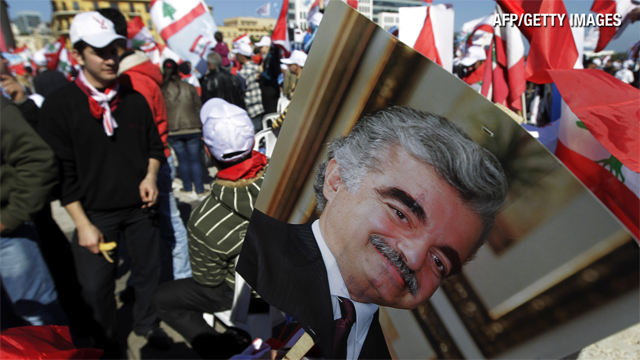Hezbollah leader says Israel was behind Hariri killing
- Hezbollah's Nasrallah: "No one is allowed to investigate Israel"
- Four Hezbollah members were indicted in connection with the killing, a source told CNN
- Nasrallah says the court's goal is to sow Sunni-Shiite division
(CNN) -- Hezbollah leader Hassan Nasrallah repeated his stance that Israel was behind the killing of Lebanon's former prime minister six years ago and slammed the U.N.-backed court for sowing discord in Lebanon.
"The tribunal was established for an obvious political goal, and no one is allowed to investigate Israel," he said on Lebanese TV Saturday, explaining his position on the Special Tribunal for Lebanon's indictments in connection with the 2005 attack, which left Rafik Hariri and 22 others dead.
"Instead of investigating with Israel, they cooperated with Israel."
The tribunal submitted to Lebanese authorities a sealed indictment and arrest warrants this week for an unknown number of suspects. A highly placed source in the Lebanese Army told CNN the four include Mustafa Badreddine, Hasan Oneisa, Salim Ayyah and Asad Sabra -- all Hezbollah members.
Many Lebanese believe the killing revolved around the controversies over Syria's role in Lebanon, occupied at the time by Syrian troops, and the Damascus government's strong political influence in Lebanon.
 Hezbollah: Israel behind Hariri death
Hezbollah: Israel behind Hariri death
 Will Hariri indictments unite or divide?
Will Hariri indictments unite or divide?
 Hariri indictments a 'historic moment'
Hariri indictments a 'historic moment'
Many Lebanese believe Hariri wanted the Syrians to withdraw from Lebanon and lessen Syria's influence, and many suspect that Syria and its ally Hezbollah went after Hariri because of his stance on this issue.
Hezbollah is a Shiite political faction in Lebanon that provides social services to its constituents. It has long been regarded as a terrorist organization by the United States and as an ally of Iran.
It has had longstanding animosity toward the tribunal, based on the expectation that some of its members would be indicted as conspirators in Hariri's assassination. Nasrallah has accused the group's arch-enemy Israel of the assassination.
Nasrallah also criticized the Special Tribunal for Lebanon, which issued the indictments, for sowing discord.
"We cannot cancel the tribunal because the tribunal was created by the U.N. Security Council that is ruled by the American will," he told viewers of al-Manar, the Lebanese TV station affiliated with Hezbollah.
"The most dangerous goal of this tribunal is to create strife, a civil war in Lebanon, or especially a division between the Sunni and Shiite in Lebanon."
A U.N. source familiar with the tribunal said the people indicted include alleged perpetrators on the ground.
Badreddine -- who is the brother-in-law of Imad Mughniyeh, a former Hezbollah commander who was assassinated in Syria in 2008 -- is reported to be a member of Hezbollah's advisory council.
Two additional lists of indictments are expected later this summer and are expected to include the organizers and planners of the attack, the U.N. source said.
Those suspected connections of Hezbollah and the Syrian government to the killing have raised tensions in the country, stoking fears of sectarian conflict erupting in the ethnically and religiously diverse nation, which endured a civil war from 1975 to 1990.
Syria had thousands of troops in Lebanon and great influence in the country until mass protests after Hariri's assassination, known as the Cedar Revolution, forced their withdrawal. Syria has denied any involvement in the assassination.
Another result of the anger toward the attack was the creation of the tribunal. The United Nations and the Lebanese Republic negotiated an agreement on the establishment of the body, based in the Netherlands.
